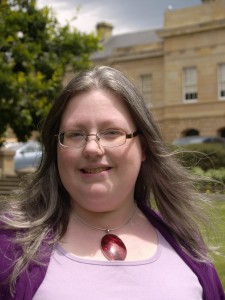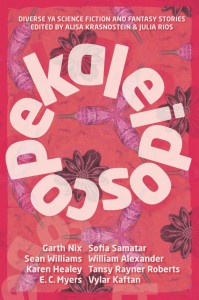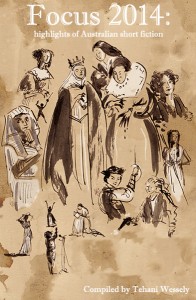
Tansy Rayner Roberts
This is the third year that indie press Fablecroft has produced a Focus volume, a series that collects an elite selection of work which has received acclaim via national and international Awards recognition. So, naturally, I have subjected the ToCers to a series of questions.
First writer off the rank is the de-lovely Dr Tansy Rayner Roberts.
What was the inspiration for your story, “Cookie Cutter Superhero”?
It was written for Kaleidoscope (which was looking for diverse teen protagonists) and I knew I wanted to write a story about disability from the point of view of a teenager. I was really interested in the downside of prosthetics, and how for some users working around a missing limb is preferable to using an artificial one – as an able-bodied person, it’s a hard idea to wrap your head around, that the medical “fix” isn’t going to work for everyone.
I wrote about superheroes because it’s a topic I know well, and it gave me a chance to address many of the things that drive me nuts about super team books – the ‘only one girl’ tradition (that the films are replicating long after comics stopped doing it), the way that female superheroes are often treated as afterthoughts and fashion plates, and the spinoff tradition around so many of our more iconic female superheroes, where they’re a legacy of a more famous male hero and get dismissed as part of his story. 
Combining these two ideas also allowed me to address the pervasive (and often problematic) trope of disability in comics, where becoming a superhero is either a magical cure, or the disability itself is expressed as a superpower. The question of whether my protagonist will be “cured” of her amputated arm by becoming a superhero is central to the story, and the answer isn’t (cannot be) a simple one.
What should new readers know about you?
I write fiction, blog and podcast about SFF with a particular focus on feminist issues. I love superheroes. I recently finished a web serial on my blog which is a gender-swapped space opera take on The Three Musketeers, which you can read for free. If readers like “Cookie Cutter Superhero”, they’ll probably also like my novelette Fake Geek Girl, which was published at Review of Australian Fiction. One of the podcasts I co-host, Galactic Suburbia, recently won a Hugo. Oh, and I’m going to be doing an episode by episode review of upcoming Netflix series Jessica Jones (about a failed superhero playing noir detective) for Tor.com in November!
Can you remember the first story you read that made you want to be a writer?
Probably the Little House on the Prairie series – I read them because a friend I played with at school adored them, and was always insisting that we played that at lunchtime. Yes, I was live action RPing at the age of 9! (I was Laura) I was definitely drawing book covers of the books I planned to write at that age (so much quicker than writing them) and pretty much every time I read a new genre or style of story, I planned to write a book along the same lines. My lack of followthrough before Grade 8 means the universe was deprived of my French Ballet epic, my prairie romances, my Anne of Green Gables style family sagas, my British high school prankfests, and so on.
Name your top five favourite authors.
This is a terrible question to ask a person whose social life is 80% other authors! Mary Wesley, Diana Wynne Jones, Terry Pratchett, Eva Ibbotson, Alexandre Dumas.
The future of Australian spec-fic is …?
Small press. They’re the reason we have such a thriving short fiction scene, and it’s not just a place where new writers cut their teeth any more – it’s for established writers to bring their experiments, their out-of-the-box fringe writing, as the big publisher lists shrink. My own experience is that the small presses aren’t just supportive and dynamic in response to the changing book industry, but that they’re also great on international distribution – not to mention nurturing writers, fragile honeybees that we are, into creating innovative work with a distinctive Australian voice.

Tansy Rayner Roberts is the author of the Creature Court trilogy, Ink Black Magic and Love & Romanpunk, among many other SFF books. She is a Hugo-award winning blogger and podcaster, living in Tasmania with her family. You can find Tansy at her blog http://tansyrr.com/ and on Twitter @tansyrr. Tansy also writes cozy culinary murder mysteries under the name Livia Day.

